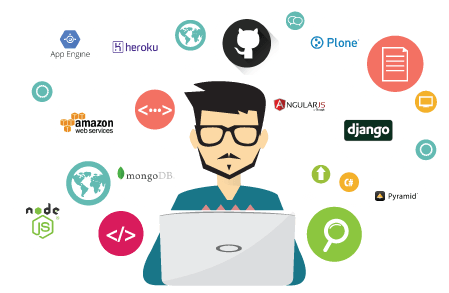
Django Mobile App Development | Egrove Systems | Python Application Development
Progressive Web Apps (PWAs) Using Django: A New Frontier in Django Mobile App Development
Progressive Web Apps (PWAs) represent a significant shift in mobile app development, offering a hybrid solution that combines the best features of web and mobile applications. For businesses looking to provide a seamless, app-like experience without the complexities of developing and maintaining native apps, PWAs offer an attractive alternative. The Django framework, known for its robustness and flexibility, is well-suited to PWA development, making it a powerful tool in the arsenal of developers focused on Django mobile app development.
What are Progressive Web Apps?
Progressive Web Apps are web applications that load like regular websites or web pages but offer enhanced functionality such as offline access, push notifications, and device hardware access, traditionally available only in native apps. Standard web technologies like HTML, CSS, and JavaScript build PWAs, offering an experience that rivals native apps in terms of speed, reliability, and engagement.
Why use Django for PWA development?
Django’s architecture and capabilities align well with the needs of PWA development. It’s a high-level Python web framework that encourages rapid development and clean, pragmatic design. Here’s why Django is an excellent choice for developing PWAs:
1. Scalability: Django’s robust architecture can handle the complexities of PWA development, including the ability to scale as the app grows in user base and functionality.
2. Security: Django comes with built-in security features such as protection against cross-site scripting (XSS), cross-site request forgery (CSRF), and SQL injection, making it a secure choice for developing PWAs.
3. Efficiency: Django’s ORM (Object-Relational Mapping) simplifies database interactions, making data management more efficient, which is crucial for the real-time and dynamic nature of PWAs.
4. Rapid Development: Django’s built-in tools and modules accelerate the development process, allowing developers to focus on creating a smooth and engaging user experience.
Key Features of Django-Developed PWAs
1. Offline Capabilities: By integrating Django with service workers, developers can ensure that PWAs function even without an internet connection. This is particularly beneficial for users in areas with unreliable internet access.
2. Push Notifications: Without the need for a native app, Django can implement push notifications in PWAs to keep users engaged and informed.
3. Fast Loading Times: Django’s efficient data management, combined with the caching strategies used in PWAs, ensures that apps load quickly, even on slow networks.
4. Cross-Platform Compatibility: PWAs developed with Django are accessible on any device with a web browser, eliminating the need for separate apps for different platforms like iOS and Android.
The Future of Django Mobile App Development with PWAs
As the demand for mobile-first solutions grows, Django mobile app development is poised to play a critical role in the evolution of PWAs. The framework’s versatility allows developers to push the boundaries of what PWAs can achieve, creating apps that are not only accessible and reliable but also feature-rich and highly engaging.
In conclusion, combining the power of PWAs with Django’s capabilities offers a compelling solution for businesses seeking to reach a wider audience without the overhead of traditional app development. As the mobile landscape continues to evolve, Django mobile app development, with a focus on PWAs, will undoubtedly become a key strategy for delivering exceptional user experiences.
© 2024 Crivva - Business Promotion. All rights reserved.